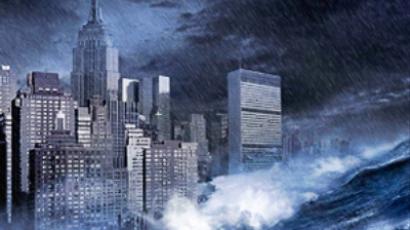Summer inferno spreads ever closer towards Russian capital
Russia's emergency services are bracing themselves for the worst, as forest and peat fires continue to rage in many parts of the country.
What makes firefighters concerned is that the relentless heat wave is keeping the landscape tinder-dry, and scorching temperatures are set to top 40ºC in the next few days.
Seventeen regions of Russia are currently aflame. Seven of them, including the Moscow region, have declared a state of emergency. The southern part of the Russian capital’s district is so thick with smoke that it is hard to breath and visibility is very low.
According to Emergency Minister Sergey Shoigu, there are 246 serious wild fires still burning in Russia. Satellite photos suggest that their overall number exceeds 500. One hundred and fifty thousand emergency workers are busy extinguishing fires, in addition to the firefighters and army servicemen occupied with the same task. The number of volunteers also runs into the thousands.
For the moment, their united effort has resulted in the rescue of more than 300 residential areas and villages from the oncoming fires.
In Moscow the smoke in the air is so thick in places that it is cloaking the tallest buildings. The city is so blanketed that, even during the day, sunlight is poor at best. Muscovites are strongly advised to wear masks to protect themselves from the polluted air.
Russian president Dmitry Medvedev arrived in Moscow from his summer residence to hold a meeting regarding the situation with representatives of the Emergency Ministry, prosecutors and other agencies.
At the meeting Medvedev ordered the urgent preparation of a new fire safety program and to review the list of potentially dangerous objects. He also announced a number of discrete measures to improve fighting the fires.
He criticized the Ministry of Defense in regards to the recent blaze at one of its facilities in the Moscow region and fired several officials responsible for the incident.
Country living hardest hit
Although it has already been five days since fires incinerated one village, the ash clouds are still so thick that they are blotting out the sun.
Firemen continue to patrol the area as more flames break out. For homeless fire victim Igor Rerin, their efforts don’t matter anymore.
“My daughter ran up and said a bus is waiting and everyone is being evacuated. We already had our bags packed. My wife walked around the cattle with a religious icon asking for protection… but even the barns have vanished,” Igor said.
A wall of flames up to 300 meters wide was more than the firemen could handle. All but a few of the one hundred houses were totally destroyed.
Everything Igor had built up in 30 years living in the village – the family home, their daughter’s house, their cattle, even some of their dogs – were lost to the wildfires.
Just 15 kilometers away another village lies in the path of the flames; its people are worried the same fate awaits them.
They complain that they are on their own. The men have dug a ditch around the village with tractors, but the smoke is everywhere and they do not know where to expect the fire to come from next. The villagers say nobody is informing them about anything.
However, for those whose battle with the fires ended in defeat, temporary shelters have been set up.
Some of the evacuees were taken to a school building. Aid is received as often as four times a day, but it is still not enough. The most basic things are much needed – from underwear to pillows and warm clothes.
Back in Moscow, volunteers are assembling what help they can. It is believed that there are enough supplies, but the issue lies in physically getting it out to the rural areas.
“We have huge problems with transportation because we do not have cars of our own,” explained aid volunteer Marina Kochevalova.
According to current statistics, 48 people have died and more than 3,000 people have been made homeless by the wildfires.














